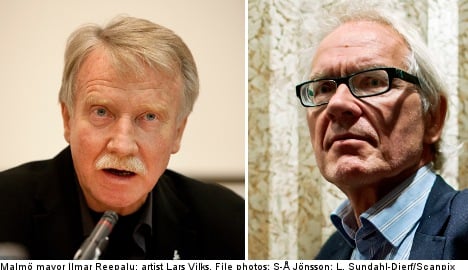“Of course he has the right to display what he calls art anywhere he wants,” Mayor Ilmar Reepalu told the TT news agency.
“But as far as I can gather, this is pretty bad art and I think they want to use the gallery for political ends,” he added.
“Vilks is increasingly associated in people’s minds with xenophobic groups at the far right of the political spectrum. I hope not a single person visits the gallery.”
News of the show, set to open in July, prompted representatives from different religions in the multicultural southern city to call an emergency meeting,
Some observers appeared frightened that the show would provoke a violent reaction.
“I urge everyone to avoid violence in their demonstrations, because then the cause will be lost,” said Björn Lagerbäck of the municipal anti-discrimination project Dialogforum.
Vilks has faced numerous death threats since his drawing of the Muslim prophet with the body of a dog was first published by Swedish regional daily Nerikes Allehanda in 2007. It was published to illustrate an editorial on free speech.
The new paintings of Muhammad would show the prophet – still with a dog’s body – transplanted into famous works by artists including Claude Monet, Peter Paul Rubens and Anders Zorn, Vilks told the AFP news agency.
It was “hard to tell” whether the July exhibition would prompt more protests and threats, he added.
“At some point this has to be over and done with,” said Vilks, who has already met with the police to discuss safety at the show.
In 2009, Colleen LaRose, an American woman calling herself “Jihad Jane”, was arrested in the US with seven others for plotting to kill Vilks. She has pleaded guilty to terror charges and faces life behind bars.
Three men accused of plotting to murder him at an art fair in Gothenburg were acquitted by a Swedish court in January, but were fined for weapons possession.
Vilks told TT that he was pleased that his art has been given the green light by curator Henrik Rönnquist.
“It’s a breakthrough that he dares to put these paintings on show now. I am not trying to kick up a stink, I’d sooner get rid of all the drama. People should be able to criticize Islam,” Vilks said.
The show’s curator said that he is prepared to tackle the safety concerns, in order to stand up for free speech, democracy, and religious freedom.
TT/The Local/AFP/og




 Please whitelist us to continue reading.
Please whitelist us to continue reading.
Member comments